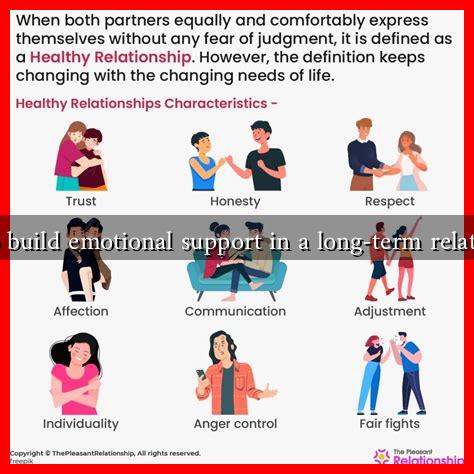-
Table of Contents
- How to Build Emotional Support in a Long-Term Relationship
- Understanding Emotional Support
- Key Strategies for Building Emotional Support
- Creating a Safe Space for Vulnerability
- Case Study: The Power of Emotional Support
- Statistics on Emotional Support in Relationships
- Conclusion: The Importance of Emotional Support
How to Build Emotional Support in a Long-Term Relationship
Emotional support is a cornerstone of any successful long-term relationship. It fosters intimacy, trust, and resilience, allowing partners to navigate life’s challenges together. In this article, we will explore effective strategies to build emotional support in your relationship, backed by research and real-life examples.
Understanding Emotional Support
Emotional support involves providing empathy, care, and reassurance to your partner. It is not just about being there during tough times; it also includes celebrating successes and sharing everyday experiences. According to a study published in the Journal of Marriage and Family, couples who provide emotional support to each other report higher levels of satisfaction and stability in their relationships.
Key Strategies for Building Emotional Support
Here are some actionable strategies to enhance emotional support in your long-term relationship:
- Active Listening: Make a conscious effort to listen to your partner without interrupting. This shows that you value their thoughts and feelings.
- Open Communication: Encourage honest discussions about feelings, fears, and aspirations. Use “I” statements to express your feelings without sounding accusatory.
- Be Present: Put away distractions when spending time together. Quality time fosters deeper connections.
- Show Empathy: Validate your partner’s feelings by acknowledging their emotions. Phrases like “I understand how you feel” can go a long way.
- Offer Reassurance: Regularly remind your partner of your love and commitment. Simple gestures like a hug or a note can reinforce your support.
Creating a Safe Space for Vulnerability
For emotional support to flourish, both partners must feel safe to express their vulnerabilities. Here are some ways to create that environment:
- Non-Judgmental Attitude: Approach discussions with an open mind. Avoid criticism and focus on understanding.
- Encourage Sharing: Make it clear that sharing feelings is welcomed and appreciated. This can help your partner feel more comfortable opening up.
- Respect Boundaries: Understand that everyone has different comfort levels when it comes to sharing emotions. Be patient and respect your partner’s pace.
Case Study: The Power of Emotional Support
A study conducted by the University of California found that couples who actively support each other emotionally are 50% more likely to stay together over a five-year period compared to those who do not. For instance, consider the case of Sarah and Tom, who faced significant stress due to job changes. By practicing active listening and open communication, they were able to navigate their challenges together, ultimately strengthening their bond.
Statistics on Emotional Support in Relationships
Research indicates that emotional support can significantly impact relationship satisfaction:
- According to a survey by the American Psychological Association, 70% of couples reported that emotional support was crucial for their relationship’s success.
- A study published in the Journal of Social and Personal Relationships found that couples who engage in supportive behaviors are 60% more likely to report high levels of relationship satisfaction.
Conclusion: The Importance of Emotional Support
Building emotional support in a long-term relationship is essential for fostering intimacy, trust, and resilience. By practicing active listening, open communication, and creating a safe space for vulnerability, couples can enhance their emotional connection. Remember, emotional support is not a one-time effort but a continuous process that requires commitment and understanding from both partners.
In summary, prioritize emotional support in your relationship to cultivate a deeper bond and navigate life’s challenges together. For more insights on relationship dynamics, consider exploring resources from the American Psychological Association.

